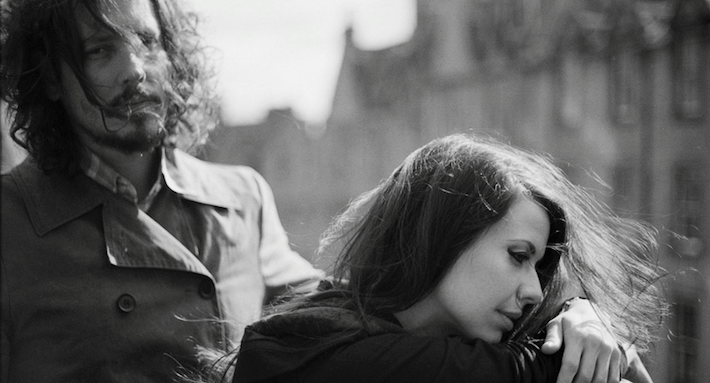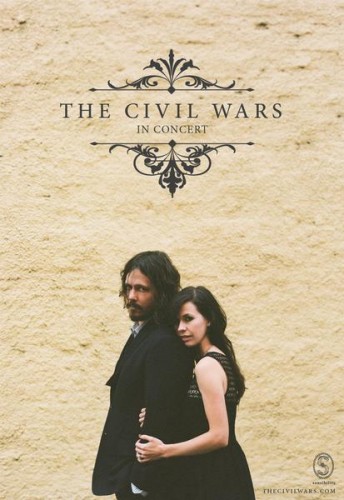

Last week the highly-publicized civil war between The Civil Wars came to a not-so-shocking conclusion. They have broken up, for good.
The folk duo went on hiatus in November 2012, cancelling their tour and inspiring speculation about alleged “internal discord.” The conflict, which remains unclear, didn’t prevent the duo from releasing a second and final album last summer. After a year of silence, they once again make headlines only to quash whatever hope remained that they might reconcile and get back on the road. In memoriam: The Civil Wars made fantastic music.
Although never romantically “together,” The Civil Wars spoke to the ins and outs of real relationships. Often, they wrote songs about people who were together but felt far, far apart. Poison and Wine, their first single from their debut album Barton Hollow (2011), boasts the lyrics, “I don’t love you but I always will.” The contradiction is a perfect lead-in to the rest of their music, about relational tensions resonant and the human heart. Henri Nouwen argues that “Intimacy between people requires closeness as well as distance. It is like dancing.” Over the course of two raw albums and one short-lived career, The Civil Wars gave life to this so-called dance.
In a less tender way, Birds of a Feather explores fidelity and the challenges of it. Taking on the tone of a middle-aged couple, they bicker: “She’s the absinthe on my lips, the splinter in my fingertips, but who could do without you? … Dancing with a ball and chain, through it all we still remain.” With unrestrained honesty, The Civil Wars expressed the paradox of relationship: somehow united and apart at the same time.
 Even in the closest relationships, pain is an inescapable part—a past offense, or a present distance, or two unaligned desires. We experience these troughs and peaks with God as well. Often God seems far from us, and we, of course, are “prone to wander,” and even take methodical steps in the wrong direction. With us, God dances with a ball and chain.
Even in the closest relationships, pain is an inescapable part—a past offense, or a present distance, or two unaligned desires. We experience these troughs and peaks with God as well. Often God seems far from us, and we, of course, are “prone to wander,” and even take methodical steps in the wrong direction. With us, God dances with a ball and chain.
The Civil Wars also open redemptive doors. Their song Dust to Dust captures unconditional love:
All your acting, your thin disguise,
All your perfectly delivered lines,
They don’t fool me—
You’ve been lonely too long
Henri Nouwen acknowledges this relational dance that The Civil Wars tap into so poignantly. He cites Ecclesiastes, writing,
“‘A time for mourning, a time for dancing.’ But mourning and dancing are never fully separated. Their “times” do not necessarily follow each other. In fact, their “times” may become one “time.” Mourning may turn into dancing and dancing into mourning without showing a clear point where one ends and the other starts.
Often our grief allows us to choreograph our dance while our dance creates the space for our grief. We lose a beloved friend, and in the midst of our tears we discover an unknown joy. We celebrate a success, and in the midst of the party we feel deep sadness. Mourning and dancing, grief and laughter, sadness and gladness—they belong together as the sad-faced clown and the happy-faced clown, who make us both cry and laugh. Let’s trust that the beauty of our lives becomes visible where mourning and dancing touch each other.”
The Civil Wars explore the line where mourning and dancing touch. Just for kicks, it’s worth mentioning their obviously rockin spirituals, From This Valley, and the most crisp version of O Come, O Come Emmanuel that you’ve ever heard. Also notable is their soundtrack for A Place at the Table, a documentary on hunger in America, which was quietly released in the midst of their break. This fall, as the leaves begin to change, and as you reflect on Nouwen’s challenge, consider letting The Civil Wars soundtrack your personal civil wars.

COMMENTS
One response to “Dancing With a Ball and Chain: In Honor of The Civil Wars”
Leave a Reply













It’s all about The Fall, isn’t it? A man and a woman. Beautiful. So talented. So much potential. But put them in a room alone and what happens? Trouble. “She also gave . . . and he ate.”